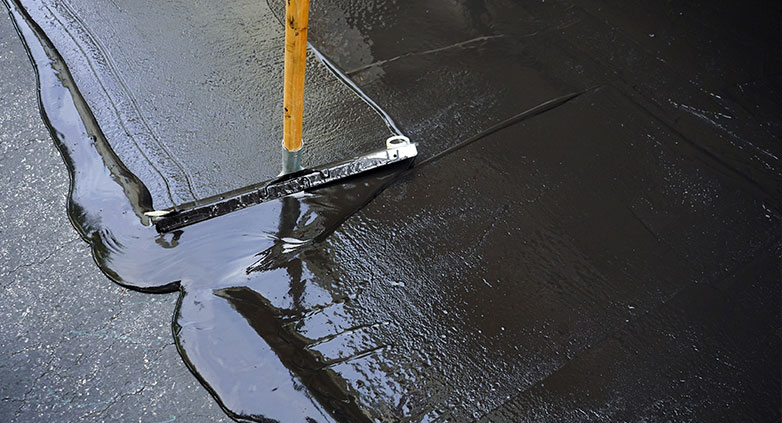What Is Sealcoating – A Guide to Protecting Your Asphalt
Asphalt Sealcoating is an essential process for maintaining the longevity and appearance of your driveway or parking lot. It involves applying a protective coating to shield the asphalt from harmful elements.
Sealcoating is the practice of applying a protective layer over asphalt pavements, like driveways and parking lots. This coating, typically made from a mixture of water, sand, polymers, and other additives, protects the asphalt from oxidation, UV rays, and chemical spills. Regular sealcoating not only doubles the lifespan of the pavement but also enhances its appearance, providing a moisture-resistant, skid-free surface. Economically viable, sealcoating is a preventive maintenance option far less expensive than complete pavement replacement.
Explore further to understand the crucial benefits of sealcoating, how it prolongs pavement life, and the cost-effectiveness of this method compared to total driveway replacement.
Composition of Sealcoat
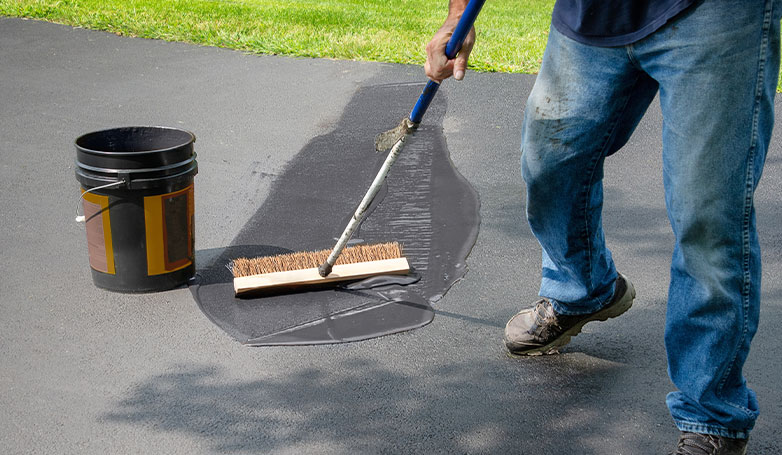
Let’s break down the composition of sealcoat to understand its pivotal role in pavement maintenance.
Key Ingredients of Sealcoat
Sealcoat is a unique mixture designed to protect and enhance asphalt pavements. The primary components of most sealcoat formulas include a liquid base, usually bituminous or acrylic-based, combined with water. This blend forms the foundation of the material, ensuring a smooth and even application over the asphalt surface.
Additives for Enhanced Performance
To the base mixture, various additives are incorporated. Polymer additives are crucial, offering extra strength and flexibility to the sealcoat, improving its durability against traffic and environmental conditions. Other common additives might include anti-oxidants and UV blockers, which help in protecting the asphalt from sun damage and oxidation, a primary cause of pavement aging.
Fillers for Stability and Texture
Silica sand and other similar fillers are also mixed into sealcoat. These fillers provide stability to the mixture and contribute to the texture of the finished surface. The presence of sand and fillers also aids in making the surface skid-resistant, a vital safety feature for both vehicles and pedestrians.
Colorants and Aesthetic Enhancers
Though not always included, some sealcoat products may contain colorants or other aesthetic enhancers. These components are used to improve the appearance of the asphalt, making it look more vibrant and new. They can also contribute to the overall uniformity of the coating, ensuring a consistently attractive finish across the entire pavement.
Eco-Friendly and Safe Options
In recent years, the composition of this solution has evolved to include more eco-friendly and safer options. These formulations are designed to minimize environmental impact and health risks, especially concerning volatile organic compounds (VOCs) emissions. Such advancements in sealcoat composition demonstrate the industry’s commitment to sustainability and safety without compromising on performance.
Types of Asphalt Sealers
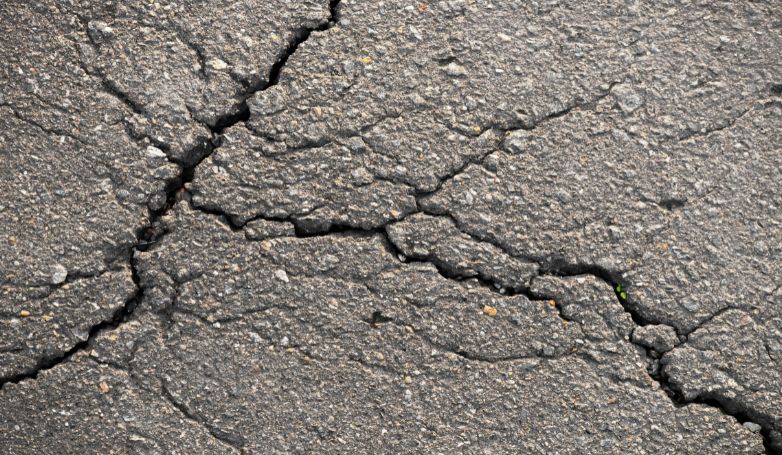
The adhesive used in road building, asphalt bitumen, is a naturally occurring byproduct of crude oil. Asphalt bitumen is the main component of the seal coat. It is heated to a temperature exceeding 240 degrees Fahrenheit to make the material viscose. Other seal coats on the market don’t require heating up and are constructed of synthetic tar materials.
To keep ice and water from entering and affecting the integrity of your driveway or parking lot, asphalt sealcoating entails sealing asphalt cracks. Asphalt deteriorates with time due to rain, oil, and other pollutants, leaving a brittle surface that is dangerous and unappealing.
With a pavement sealing strategy, many homeowners opt to maintain their asphalt. You’ll save time and money when you repair your driveway instead of replacing it for thousands of dollars.
Examples of asphalt sealers are:
Fast Dry Sealers
Fast dry sealants repair heavily traveled portions of the road, such as parking lots and main thoroughfares leading to public buildings like hospitals and gas stations. Due to the additional geotextile fibers incorporated into the sealant, the most excellent part about using rapid dry sealers is that they cure in less than an hour.
Fast dry sealers are significantly more expensive than other varieties of asphalt sealers as a result of this, nevertheless. Small-scale purchases of this sealer will also be complex because most fast dry sealer producers only do business with road construction firms. You might wish to buy in quantity and split the cost with your neighbors when you eventually locate a provider that sells this sealer kind.
Coal Tar Sealers
The most widely used asphalt sealer on the market is coal tar because it offers a long-lasting, lustrous sheen and is weather-proof. As their name implies, coal tar sealers include a significant proportion of coal tar and additional polymers and strengthening agents. By baking coal, this water-based sealant is created. Coke is then removed from the baking process and used as the primary ingredient in coal tar sealers, which is why they are resistant to chemicals derived from petroleum.
Acrylic Sealers
Acrylic sealers, another pricey variety of asphalt sealers, are the pinnacle of what a good asphalt sealer ought to be. They can be colored in black, red, green, or transparent shades, making them easy to identify. They are UV-resistant, robust, and resistant to extreme weather conditions. These sealers are often applied to outdoor basketball courts, tennis courts, and parking lots at retail centers.
Acrylic sealers are also environmentally harmless because they don’t contain any petroleum byproducts. The fact that this sealer only needs to be treated once every seven years adds to its many beautiful advantages and helps to save maintenance expenses.
Asphalt Emulsion Sealers
Since they are made of asphalt, asphalt emulsion sealers are frequently referred to as an eco-friendly driveway protection option. It should be emphasized, however, that no studies or recognized research have established the dangers or pollutants brought on by using coal tar-based sealers when paving one’s road. Asphalt-based sealants do a better job of maintaining the air quality, smell nicer, stop oxidation, and do not irritate the skin.
However, one disadvantage of using asphalt emulsion sealers is that they are susceptible to stains from oil or gas leaks. This sealer can only be used between May and September for best curing, and it is tough to apply it at night when the temperature is at its lowest.
How to Apply Seal Coat to Asphalt in 7 Steps
Here’s a step-by-step guide to ensure your asphalt gets the protection and enhancement it deserves:
- Cleaning the Asphalt Surface: Start by giving your asphalt a good, thorough clean. Sweep away loose debris, then tackle those tough stains with a pressure washer or a specialized cleaner. It’s like prepping a canvas before painting – crucial for ensuring the sealcoat adheres properly and lasts longer.
- Repairing Cracks and Damages: Think of this as healing your asphalt’s wounds before applying a protective coat. Fill in those cracks and mend any holes. This step is vital for a smooth finish and prevents water from seeping in and causing further damage.
- Preparing the Sealcoat Mixture: Now, it’s time to mix your sealcoat. Follow the product’s recipe closely – it’s like baking; the right proportions matter a lot. Get the consistency just right for an even, effective application.
- Applying the Sealcoat: With your tools in hand, apply the sealcoat gently and evenly across the asphalt. It’s like painting a large canvas, requiring steady hands and a keen eye to cover every inch evenly without overdoing it.
- Allowing for Drying and Curing: Patience is key here. Give the sealcoat time to dry and cure completely. This step is essential for the longevity of your work, ensuring the sealcoat sets properly to protect your pavement.
- Inspecting and Touching Up: After drying, inspect your work. Look for any spots you might have missed or areas that need a bit more sealcoat. This attention to detail ensures a top-notch finish and comprehensive protection.
- Applying a Second Coat (if necessary): Sometimes, a second coat is needed for that extra layer of protection, especially in areas with heavy traffic. If you go this route, repeat the application process with the same care and attention as the first coat.
Each step in this process is crucial for ensuring a long-lasting, protective sealcoat that keeps your asphalt in top condition for years. Remember, a well-maintained asphalt surface is not just about looks; it’s about longevity and safety too.
Which type of seal coat should you choose?
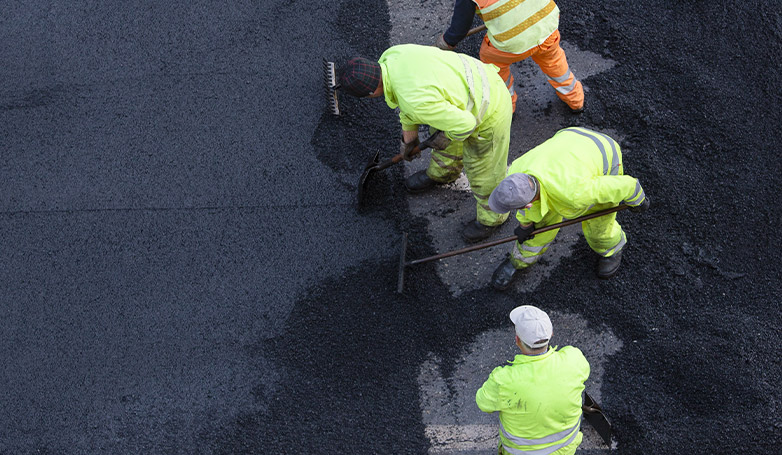
The following qualities will be present in a quality sealer:
- Quick Drying: For the highest quality, look for a drying period of three to four hours.
- Long-Lasting: For asphalt maintenance, look for a seal coat lasting at least two to three years.
- Airport Grade: For protection against aviation fuel spills, airports must utilize the best asphalt seal coat. Looking for airport-grade asphalt only confirms you are purchasing the best available stock.
- High-Demand Clients’ Usage: Look for positive seal coating reviews online from high-demand clients like golf courses, churches, and mall parking lots.
You want to be sure that the money you spend on maintaining your asphalt is a good investment. Make sure you choose the appropriate asphalt seal coat for your pavement by keeping in mind the subpar sealer projects you’ve seen in your neighborhood. To determine whether a sealer is good or bad, look for the essential positive and bad characteristics.
Benefits of seal coating asphalt driveways and parking lots
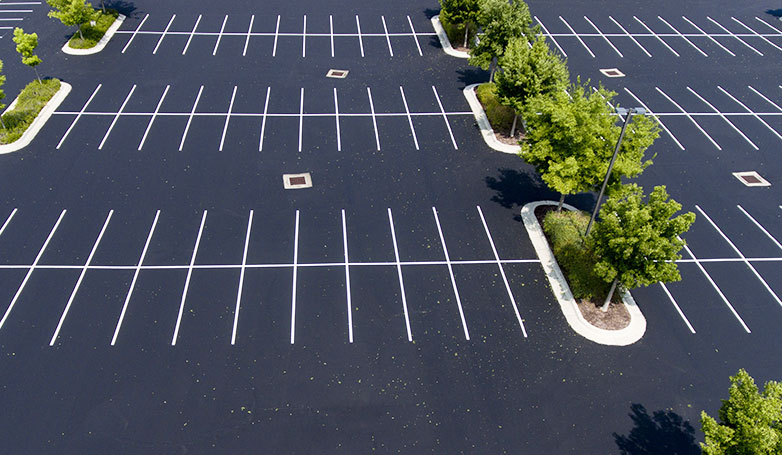
One of the many reasons homeowners or business owners choose asphalt pavement over other paving materials is how effortless it is to maintain. Sealcoating asphalt is an essential part of maintaining your asphalt driveways and parking lots; some of its benefits include the following;
Extends pavement durability
Proper installation of asphalt pavement is not enough to keep it from wearing away. To extend its lifespan, you must seal your asphalt pavement. A vital benefit of seal coating is its ability to preserve and prolong driveway lifespan.
Protects you from extra cost
An asphalt driveway is naturally appealing to the eyes; if you want it to remain attractive, you will have to put in some effort to seal your entire driveway. This helps you save money on repairs and other maintenance measures.
It makes cleaning easy and fun
Asphalt-sealed pavement allows you to clean the surface without much effort. Also, washing away with water and a broom is easy when you have oil spills. Sealed pavement won’t stay tugged to your broom when you try to clean.
Protects pavement from harmful elements
Due to asphalt nature, a harmful element can easily bind to asphalt pavement and cause it to deteriorate faster. A sealed pavement prevents harmful or petroleum-based elements from binding to asphalt.
Prevent water from softening the surface
Asphalt pavement is not permeable and does not allow water to penetrate the surface. However, when your asphalt pavement starts to wear out, it develops cracks that give water access or even create puddles. Sealcoating your asphalt doesn’t just prevent them from cracking. Also, it prevents moisture or water from getting beneath the pavement surface.
What is the average cost to seal coat a driveway?
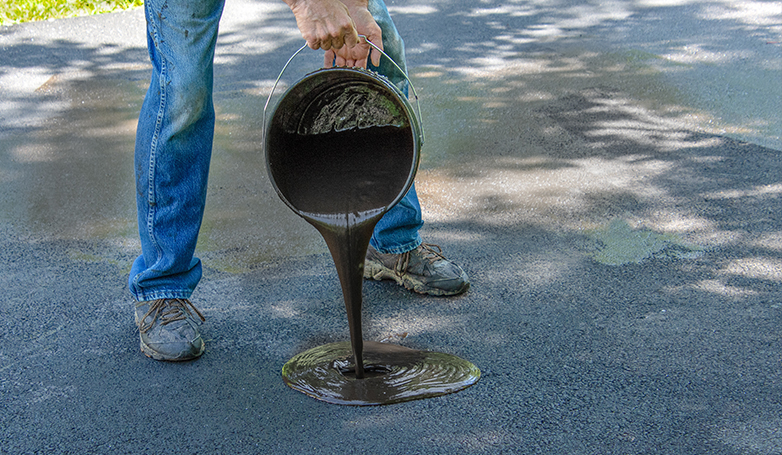
Driveway sealing costs might vary depending on several factors. Due to factors including square driveway footage, driveway material, driveway condition and accessibility, sealant type and the number of applications, labor cost, and location, prices may vary from the national average.
The nationwide average price for driveway sealing is $486, according to Angi and HomeAdvisor, with charges ranging from $250 to $768. Products for sealing asphalt typically cost between $0.06 and $0.38 per square foot. With this price range, 5 gallons of effect can cover up to 500 square feet of driveway surface for between $40 and $165.
The thickness of the sealant can affect the coverage of the driveway sealing. While covering less surface area, thicker goods offer a more concentrated layer of security than thinner ones.
FAQs about what is sealcoating
Here are some frequently asked questions to help clarify the role and importance of sealcoating.
Is sealcoating worth the money?
Absolutely, sealcoating is a cost-effective method to extend the lifespan and maintain the appearance of asphalt pavements. It acts as a barrier against elements that can degrade asphalt, such as UV rays, water, and oil spills. By regularly applying sealcoat, you can avoid the more substantial costs associated with repairing or replacing damaged asphalt.
What is the difference between seal coat and asphalt?
Asphalt is a durable material used for paving roads, driveways, and parking lots, primarily composed of bitumen and aggregates like sand, gravel, and stones. Sealcoat, on the other hand, is a protective coating applied over asphalt. It’s designed to shield the asphalt from environmental damage and wear, not to build the pavement structure itself.
What happens if you don’t seal asphalt?
Unsealed asphalt is susceptible to various forms of damage, including oxidation, UV ray damage, water penetration, and chemical spills. Over time, this can lead to fading, cracking, and potholes, making the pavement less safe and more costly to repair.
How long does asphalt sealer last?
The lifespan of asphalt sealer typically ranges between 2 to 5 years, depending on the traffic volume, the quality of the sealant used, the climate, and how well the asphalt has been maintained.
What are the cons of sealcoating?
While sealcoating offers numerous benefits, there are a few drawbacks. It requires regular reapplication, can be sensitive to weather conditions during application, and the process can emit strong odors. Additionally, if not properly applied, it can peel or wear unevenly.
Does sealcoating prevent cracks?
Sealcoating helps prevent the formation of small cracks by protecting the asphalt from elements that can cause deterioration. However, it’s not a solution for repairing existing large cracks or structural issues. Regular sealcoating is part of preventative maintenance that keeps minor issues from becoming major problems.
Conclusion
So, what is sealcoating? Now you know it and maybe you are planning to fix and maintain your driveway. Before doing that, do your research and spend some time learning to prepare the asphalt sealer before applying it. Some asphalt sealers can be put straight to the pathway, while others might need to be thinned, handled differently, or allowed to cure before being applied. When in doubt, starting your endeavor is always preferable by consulting a specialist.

